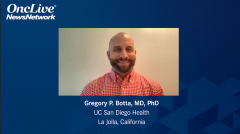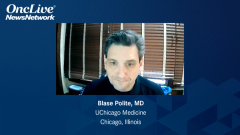
Potential Applications of ctDNA Testing in Colorectal Cancer
An overview of the ctDNA testing platforms and the potential clinical applications of ctDNA testing across the colorectal cancer disease continuum.
Episodes in this series

Blase Polite, MD: The field of ctDNA [circulating tumor DNA] is rapidly evolving. As oncologists and clinicians, we’re beginning to figure out how to incorporate it in. We’ll discuss some data and trials, but it’s important that we ensure that we have a common understanding of what we’re talking about. ctDNA analysis can come in several forms. One is a tumor-informed ctDNA, which has been pioneered by Natera. Many of the abstracts that we’ll discuss today use the Natera’s Signatera assay. This looks at the patient’s tumor, creating a proprietary set of screens for ctDNA in the blood and developing a quantitative score of the amount of ctDNA circulating in the blood. The other basic approach is a nonpatient informed assay. For example, the Guardant Reveal assay looked at a predefined set of markers and methylation status to give a positive or a negative, not a quantitative level. Those are the 2 platforms available. Neither will give you mutations, because with Signatera or Guardant Reveal, you don’t receive mutations. It’s not a typical Guardant assay where you receive a specific tumor mutation data; you’re looking at, is there or isn’t there circulating tumor? In the case of the Signatera assay, what is the quantitative level?
Today we’ll discuss the stage II and III colon cancer setting. There are many patients who we overtreat, meaning patients who are unlikely to have their cancer return and are subjected to 3 or 6 months of chemotherapy, so we can better define the high-risk population and perhaps leave those who are at lower risk alone. The other interesting area that these assays are beginning to study are areas of minimal residual disease in the stage IV colorectal cancer setting. Another area subject to controversy is what we do with patients who have liver or lung metastases that we’ve resected. Should we give them additional chemotherapy after resection? If you look at the evidence-based data, there are no data that suggests any benefit to adjuvant chemotherapy in this population. In fact, some data from Japan suggest we may be doing harm by giving chemotherapy to this population. We can imagine looking at ctDNA after resection, identifying higher-risk patients and seeing whether chemotherapy benefits that population and if it’s advantageous.
The final area we’re beginning to see data on ctDNA is immunotherapy. For example, the KEYNOTE-177 trial, which was pembrolizumab vs chemotherapy in patients with frontline metastatic colorectal cancer who were mismatch-repair deficient. Pembrolizumab had a significant advantage over chemotherapy any way you looked at it, but a third of the patients rapidly progressed on immunotherapy. There are data in immunotherapy with Signatera asking if we can look at a 6-week Signatera for patients with ctDNA that is unstable or decreasing. Increasing will likely be that third of patients who need more aggressive therapy. It allows us to initiate chemotherapy earlier in that patient population. The individuals who respond to immunotherapy continue it for the KEYNOTE -177 data. That’s the landscape of areas. We can discuss what the trials will try to answer. I know there are some burning questions among those of us in the clinical oncology and GI [gastrointestinal] oncology space.
Transcript edited for clarity.








































